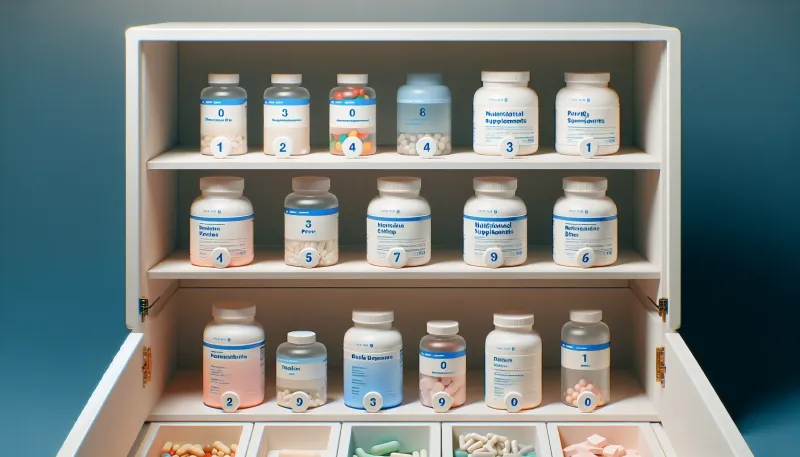Top 10 Nutritional Supplements for Children: Complete Guide for Parents

Discover the top 10 nutritional supplements for children, their benefits, usage, and expert advice. Ensure your child's optimal growth and development with our comprehensive guide.
Introduction
Ensuring that children receive adequate nutrition is a primary concern for parents. A balanced diet is often sufficient; however, many parents turn to nutritional supplements to fill any potential gaps. This comprehensive guide explores the top 10 nutritional supplements for children, their benefits, usage, and expert advice. By understanding these supplements, parents can make informed decisions to support their child's overall health and development.
1. Multivitamins
Multivitamins are among the most popular nutritional supplements for children. These supplements typically contain a variety of essential vitamins and minerals necessary for overall growth and development.
Benefits
Multivitamins can help cover dietary gaps, particularly for picky eaters, ensuring that children receive adequate vitamins such as A, C, D, and E, as well as essential minerals like zinc and iron.
Usage
Always follow the recommended dosage on the product label and consult a healthcare provider before starting any new supplement, especially for children with specific health conditions.
2. Vitamin D
Vitamin D is vital for bone health and immune function. Children may not always get enough of it through sun exposure or diet alone.
Benefits
Vitamin D supports calcium absorption, promoting healthy bone development, and strengthens the immune system.
Usage
Vitamin D supplements are available in various forms, including drops and chewables. The American Academy of Pediatrics recommends 400 IU of Vitamin D daily for infants and 600 IU for children over one year.
3. Omega-3 Fatty Acids
Omega-3 fatty acids, primarily found in fish oil, are crucial for brain development and cognitive function, particularly in young children.
Benefits
Omega-3 supplements can enhance brain function, support heart health, and reduce inflammation.
Usage
Omega-3 supplements come in liquid, chewable, and softgel forms. Dosage varies by age, but generally, a daily intake of 100-200 mg of DHA and EPA combined is recommended for children.
4. Probiotics
Probiotics are beneficial bacteria that support gut health, which is linked to overall well-being, including immune function.
Benefits
Probiotics can help maintain a healthy digestive system, reduce the incidence of gastrointestinal issues, and boost the immune response.
Usage
Available in powders, chewables, and liquid forms, probiotics should be chosen based on specific strains that are beneficial for children, such as Lactobacillus and Bifidobacterium.
5. Calcium
Calcium is essential for developing strong bones and teeth, particularly during the growth spurts in childhood.
Benefits
Calcium supplements ensure that children who may not consume enough dairy or other calcium-rich foods achieve their necessary daily intake for bone health.
Usage
Commonly available as chewable tablets or gummies, the recommended daily intake varies:
- 1-3 years: 700 mg
- 4-8 years: 1000 mg
- 9-18 years: 1300 mg
6. Iron
Iron is a crucial component of hemoglobin, which transports oxygen in the blood.
Benefits
Supplementing with iron can prevent anemia, enhance energy levels, and improve cognitive function and development in children.
Usage
Iron supplements are usually available in liquid or chewable forms. Dosage should be based on a healthcare provider's recommendation as excessive iron can be harmful.
7. Vitamin C
Vitamin C is crucial for immune support and skin health. It also aids in the absorption of iron.
Benefits
Vitamin C can help reduce the duration and severity of colds and support healthy skin, gums, and blood vessels.
Usage
Vitamin C supplements are available as chewables, gummies, or effervescent tablets. The recommended daily intake for children varies from 15 mg for infants to 45 mg for older children.
8. Zinc
Zinc is important for immune function, wound healing, and DNA synthesis.
Benefits
Supplementing with zinc can improve immune response, speed up wound healing, and support growth and development.
Usage
Zinc supplements come in various forms, including liquids, chewables, and tablets. The dosage should align with the child's age and dietary intake.
9. Magnesium
Magnesium supports muscle function, nerve function, and energy production.
Benefits
Magnesium can help with muscle function, relieve constipation, and support overall energy levels and calmness.
Usage
Available in chewable or powder forms, the daily recommended intake varies:
- 1-3 years: 80 mg
- 4-8 years: 130 mg
- 9-13 years: 240 mg
10. Fiber
Fiber is essential for digestive health and regular bowel movements.
Benefits
Fiber supplements can help prevent constipation and promote healthy digestive function.
Usage
Available as chewables, fiber gummies, or powders, the appropriate dosage will depend on the child's dietary intake and specific needs.
Consulting Healthcare Providers
Before starting any nutritional supplements for children, it is critical to consult with a healthcare provider. Every child has unique needs, and a professional can offer personalized guidance.
Conclusion
Nutritional supplements can play a pivotal role in supporting the growth and development of children, especially when dietary intake may fall short. By understanding the top 10 nutritional supplements for children, parents can make informed choices that contribute to their child's overall health and well-being. Always consult a healthcare professional before introducing any new supplement to your child's diet.



























